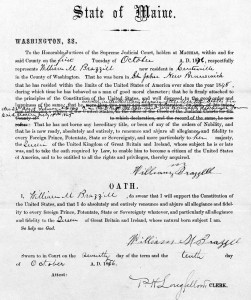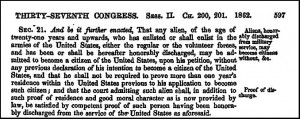Naturalization law nuggets
So I was doing my usual poking-around-in-unindexed records and came across a wonderful collection of County Court records from Washington County, Maine, on FamilySearch. The collection, called “Maine, Washington County Courthouse Records, 1785-1950,”1 boasts some 99,893 images of unindexed records including census records, military records, probate records and — the ones that caught my eye — naturalization records.
These particular records span a period of 104 years, from 1831 to 1935, and they include declarations of intent to become a citizen, naturalization petitions, registers of naturalizations and more — thousands upon thousands of images.
Now remember that under the Naturalization Act of 1802, every state or territorial court had the authority to naturalize any foreigner along with the federal district and circuit courts.2 That didn’t change until well into the 20th century.3Would-be citizens usually had to file two documents: after they’d been in the country at least two years, they filed a declaration of intent to become a citizen, and at least three years later, they filed a petition for naturalization.4
Both kinds of documents can be found there in the Washington County, Maine, records. And just about every one of them a genealogical gold mine.
Where else, I ask you, are you going to find proof that James Chatterly of Machias in Washington County, Maine, was born in the City of Chester, County of Cheshire, England, in the year 1796 and arrived in Eastport, Maine, on the 19th of June 1819?5
Or that Miles Collins of Eastport was born at County Cork in the year 1817 and came from Ireland on the 1st of April 1838, arriving at Eastport on 15 June 1838?6
Or that Ephraim F. Conrad of Calais was born in Bristol, England, on 19 July 1845 and arrived in New York on the 18th of Jan 1846?7
Or that George W. Corbett of Lubec was born 8 May 1828 at Fredericton, New Brunswick, Canada, came to Eastport at the age of three and moved to Lubec in 1850?8
Or that James Dowe of East Machias was born at Cobbigate, Nova Scotia, in 1788, came to Maine in June 1830, and lived in Lubec until the summer of 1841 when he moved to East Machias?9
Or that James Fulton of Machias was born in the “Parish of Glenmonny in the County of Dennagall” Ireland in 1798 and came to America in 1826 and to Machias in 1833?10
Nope, there aren’t many records to compare with the genealogical value of naturalization records, and they’re often missed by folks who don’t know to check the county and state and territorial courts, as well as the federal courts, for the records.
And that, believe it or not, is not what particularly caught my eye.
No, what grabbed me was a pair of naturalization petitions filed by two men with similar last names. John Brazil of Columbia, who was born in County Waterford, Ireland, and who’d lived in the United States since 1838, filed his petition for naturalization before the Supreme Judicial Court in Machias on 1 October 1876.11 And William M. Brazzell of Centerville, born in St. John, New Brunswick, Canada, who’d been in the United States since 1848, filed his petition before the same court on the same day.12
On both of these petitions, the usual language about having filed a declaration of intent was crossed out. On John Brazil’s petition, it stated, instead, that “he enlisted in the Military Service of the United States Sept 10 1862, and was honorably discharged on the first day of August 1863.” And on William Brazzell’s petition, it said “he enlisted in the Military Service of the United States on the 22nd day of February AD 1864 in the 31 Regt Me Vols. and was honorably discharged from said service July 15th 1865.”
There are two extraordinary things about that information. First, information about soldiers who fought for the Union from Maine isn’t all that easy to come by. The Compiled Military Service Records of Maine soldiers haven’t yet been microfilmed or digitized.13 And here, in these two documents, are the enlistment and discharge dates and, in William’s case, even his unit.
Second, both of these petitions were granted even though neither had filed an earlier declaration. That’s because of an incentive — a reward — offered by the Union to immigrants who served and were honorably discharged from military duty. The Act of 17 July 1862 gave such immigrants an easier, quicker route to citizenship: they could be naturalized without a declaration and only have to live in the United States for one year.14The same sort of reward for service was enacted for World War I as well — the Act of 9 May 1918 allowed immigrants who served in the military during “the present war” to become citizens without making an earlier declaration of intent and without proving they’d lived in the U.S. for the usual five years.15
Yet another example of how knowing the law can make us better genealogists: explaining why some records may be found, and not others, and telling us where to look for the records in the first place.
SOURCES
- Naturalization declarations and petitions, Washington County, Maine, Court Clerk, Machias, Maine; “Maine, Washington County Courthouse Records, 1785-1950,” database and digital images, FamilySearch (https://www.familysearch.org: accessed 15 Aug 2012). ↩
- “An Act to establish a uniform rule of Naturalization, and to repeal the acts heretofore passed on that subject,” 2 Stat. 153 (1802); digital images, “A Century of Lawmaking for a New Nation: U.S. Congressional Documents and Debates, 1774-1875,” Library of Congress, American Memory (http://memory.loc.gov/ammem/index.html : accessed 15 Aug 2012). ↩
- “Research Our Records: Naturalization Records,” Archives.gov (http://www.archives.gov : accessed 15 Aug 2012). ↩
- Ibid. ↩
- Petition of James Chatterly, District Court for the Eastern District of Washington County, Machias, Maine, 15 Sep 1840, Court Clerk, Machias, Maine; Naturalization records, Declarations of intent, Naturalization petitions, 1831-1905, A-G, “Maine, Washington County Courthouse Records, 1785-1950,” database and digital images, FamilySearch (https://www.familysearch.org: accessed 15 Aug 2012). ↩
- Ibid., Declaration of intent of Miles Collins, 13 Mar 1852. ↩
- Ibid., Petition of Ephraim F. Conrad, 14 Feb 1905. ↩
- Ibid., Declaration of intent of George W. Corbett, 5 Oct 1852. ↩
- Ibid., Declaration of intent of James Dowe, 22 Feb 1842. ↩
- Ibid., Declaration of intent of James Fulton, 12 Sep 1838. ↩
- Ibid., Petition of John Brazil, 1 Oct 1876. ↩
- Ibid., Petition of William M. Brazzell, 1 Oct 1876. ↩
- See “Microfilmed Compiled Military Service Records of Volunteer Soldiers Who Served During The Civil War,” Archives.gov (http://www.archives.gov : accessed 15 Aug 2012). ↩
- “Act to define the Pay and Emoluments of certain Officers of the Army, and for other Purposes,” § 21, 12 Stat. 594, 597 (1862). ↩
- “An Act To amend the naturalization laws …, and for other purposes,” 40 Stat. 542 (1918). ↩





Cross referenced and indexed files for Washington County, Maine records are also maintained by the Washington County Maine Records Preservation Fund Grantor and Trustee, Sharon Howland. The efforts to preserved, inventory and index these records began more than 30 years ago and became a non-profit trust in 2000 http://news.google.com/newspapers?nid=2457&dat=20000918&id=-gBgAAAAIBAJ&sjid=kw0NAAAAIBAJ&pg=6299,928319
Sharon Howland can be reached at shwkrp@aol.com
What a fabulous bit of work here! Would that more folks and places had funds like that!
Please let me know if you find a Nathaniel Littlefield hiding in those records!
Hint: most of these records are in alphabetical order…
Wow! Another set of incredible information… with implications far beyond Maine. Thanks, again! 😉
Oh, the implications are nationwide — cool, huh? Gotta love these unindexed records.
Hmmmmm…. poking around in unindexed records for fun or genealogical profit… Well, you likely had some inkling of something useful or someone related there “somewhere”! I must go searching in more unusual records and these look very useful! Thanks Judy for the oh-so-useful pointer!
Pure fun for me, Celia — I have no, repeat no, ancestors from north of the Mason-Dixon line.
Ohhhh, I do remember that now. None. While I have none south of that line. I love your idea of fun, Judy! Cheers.
What can I say? My idea of fun is… well… a little warped
We are all VERY grateful for that, Judy! 😉
🙂